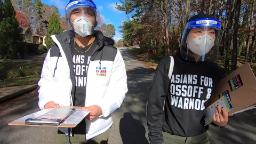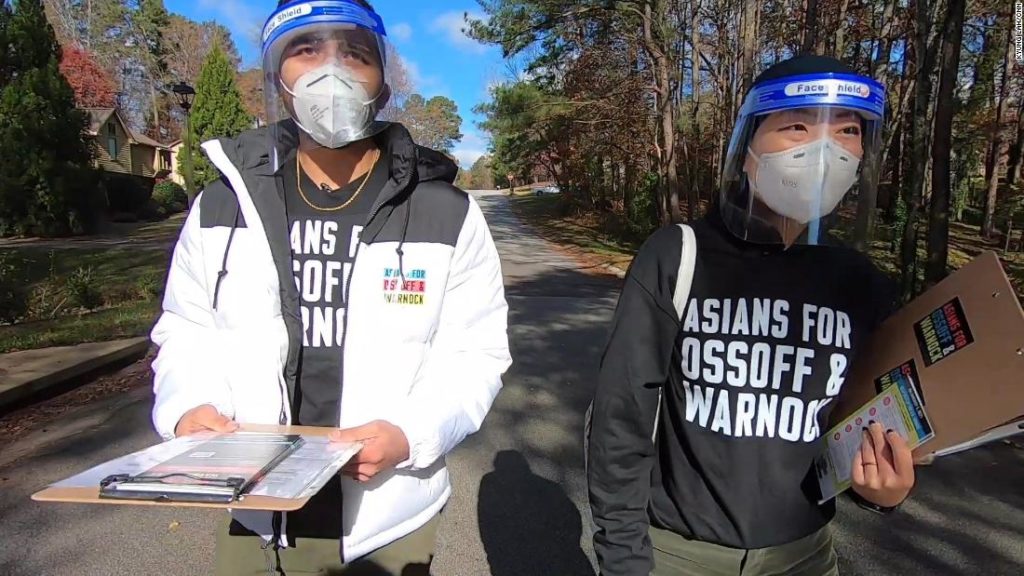
“I speak some Korean,” said Grace Pai, in Korean. “It’s terrible,” Pai added in broken Korean. Pai explained how she and her fellow volunteer, Syed Hussain, were canvassing houses for the Asian American Advocacy Fund to talk to Asian American voters for Democratic challengers in the runoffs.
“My mother immigrated to the US from Korea as a girl,” explained Pai. The homeowner, delighted to hear her native language, explained to the canvassers how much affordable health care meant to her family.
Pai pressed the woman to send her absentee ballot in by mail for Democrats Jon Ossoff and Reverend Raphael Warnock.
As Pai and Hussain left the woman’s porch, the homeowner pumped her fist in the air, promising she would.
Conversations like these are key for volunteers who believe the only chance to flip the two Republican Senate seats in Georgia to the Democrats is through broad based coalitions, which includes Asian Americans. In the state where President-elect Joe Biden defeated President Donald Trump by just 12,284 votes in November, activists say there’s little question the surge in Asian American voters helped flip the state in November.
They just have to reach them.
“There are so many people like that woman, Asian American voters who have never been asked about their political beliefs, who have never been asked why voting is important to them,” Pai said. “I think this tailored outreach means a lot.”
“It’s counties like this, at least in my view, that gave Joe Biden that win,” said Hussain, 21. The college student grew up in Gwinnett County, which has seen Korean immigrants drive the growth of Asian Americans in the Atlanta suburbs.
Across the entire Atlanta metro area, the Asian American and Pacific Islander electorate has grown significantly in recent years — mirroring the trend of the increasing and diversifying population across the state — specifically in and around the capital city of Atlanta. While AAPIs are a small share of the electorate in Georgia, the number of Asian American voters grew seven times as much as other racial and ethnic groups combined.
“I’m so happy to say it made a huge difference,” said Stephanie Cho, executive director for Asian Americans Advancing Justice-Atlanta. “I’m so proud to say we had over 30,000 new voters, Asian American voters, for the first time,” Cho said.
Cho has spent years on the ground in Georgia, organizing the AAPI community on civil rights and voting issues on shoestring budgets, often in noodle shops where volunteers paid for events and fliers with their own money. Often seen as too small a minority group to matter, Cho says demographics and community organizing are beginning to pay off at the ballot box.
“Asian Americans vote. Asians Americans care about the elections here,” said Cho, emphatically. “Asian Americans are not a monolith. I think that there was always a myth that Asian Americans care more about what was happening in their home countries than the elections in the US.”
Cho boils down beliefs like that to ignorance and assumptions and hopes November’s results teach the national parties they need the Asian American vote in battleground states.
Turning attention to the runoffs
The attention in Georgia now turns to the January 5 runoff elections for two Senate seats. Incumbent Republican Sen. David Perdue is being challenged by Ossoff, a Democrat and Republican Sen. Kelly Loeffler will face off against Democrat Warnock.
The Democratic candidates have ratcheted up their targeting of Asian Americans across the state. Both campaigns have brought on AAPI constituency directors to aid with outreach.
Warnock’s team has targeted Asian American voters by placing ads in multiple languages, from Chinese to Korean, in print and radio outlets. And Ossoff’s campaign held a meet-and-greet with Asian American voters in Decatur on Wednesday, campaigning directly to the electorate.
“We saw Asian American turnout in this election was extraordinary. And I’m here to ask humbly for the support of Asian American voters to hear from the community to address questions in the community,” Ossoff told CNN after the event.
And it’s not just the candidates in the runoffs appealing to the Asian American community — Andrew Yang, the former presidential candidate, is spending the next few weeks in Georgia to support Ossoff and Warnock.
Yang spoke at a meet-and-greet in Atlanta on Sunday with the Asian American Action Fund-Georgia Chapter and said the Senate runoffs in Georgia are crucial for the Asian American community “to continue our political awakening, an awakening that I believe has the potential to change the face of American politics.”
After the event, Yang spoke with CNN about the role he believes the Asian American community plays in American politics and what he hopes to see in the future.
“Asian Americans are waking up to the fact that we can be the swing vote in swing states like Georgia and it’s a thrill to be a part of that political awakening,” Yang said. “I firmly believe that Asian Americans have been filled with unrealized potential politically here in the US, but we’re starting to realize that potential more and more.”
Building on the past
But parachuting in just a month ahead of an election doesn’t work, say local organizers in Georgia. And the responsibility of reaching the electorate has to be on the candidates who want to win.
State Rep. Bee Nguyen, a Democrat who in 2017 filled the seat formerly held by Stacey Abrams, has spent years organizing in Georgia — many of them without any help from national parties.
“My message is you have to invest in all voters. You have to invest early, and you have to invest in on the ground strategies and build broad based coalitions,” Nguyen said.
State Rep. Sam Park, who was the first Asian American Democrat elected to the state house in 2016, agreed with Nguyen and said getting Asian American voters to turnout requires a lot of legwork and investment.
“One of the primary concerns I’ve always had when it comes to organizing particularly older Asian American voters are the various barriers that exist, primarily language,” Park said. “I know there are relatively high levels of limited English proficiency amongst older Korean American, Vietnamese and Chinese American voters. And so having an understanding of the barriers that certain voters may face, and then ensuring that your political operation and outreach program is sophisticated enough.”
Park continued by saying it’s crucial for these campaigns to invest in hiring Asian American organizers and bringing in community leaders who want to build upon the success they’ve seen in recent years by engaging the Asian American community.
Nguyen believes if candidates want to win a broad-based coalition, they need to go out and earn the votes of their district, just as she did in her own district. Nguyen’s state district 89 is predominately Black and White, with very few Asian Americans living in it.
“When I first ran for office, people said, ‘Who is your base going to be? You can’t win without a base,’ assuming that I could only win if I had AAPI voters turn out for me,” Nguyen said. “But that is not the way that voters work. Voters will come out for people who have conversations with them who see them, who talk to them and who consider them to be an important part of the electorate.”
You may also like
-
UK coronavirus variant has been reported in 86 countries, WHO says
-
NASA technology can help save whale sharks says Australian marine biologist and ECOCEAN founder, Brad Norman
-
California Twentynine Palms: Explosives are missing from the nation’s largest Marine Corps base and an investigation is underway
-
Trump unhappy with his impeachment attorney’s performance, sources say
-
Lunar New Year 2021: Ushering in the Year of the Ox

